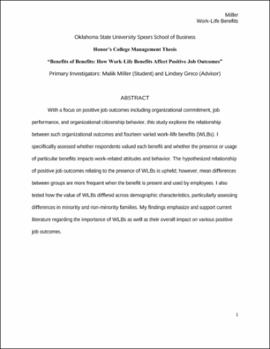| dc.contributor.author | Miller, Malik | |
| dc.date.accessioned | 2019-02-09T14:24:24Z | |
| dc.date.available | 2019-02-09T14:24:24Z | |
| dc.date.issued | 2017-05-01 | |
| dc.identifier | oksd_miller_HT_2017 | |
| dc.identifier.uri | https://hdl.handle.net/11244/317244 | |
| dc.description.abstract | With a focus on positive job outcomes including organizational commitment, job performance, and organizational citizenship behavior, this study explores the relationship between such organizational outcomes and fourteen varied work-life benefits (WLBs). I specifically assessed whether respondents valued each benefit and whether the presence or usage of particular benefits impacts work-related attitudes and behavior. The hypothesized relationship of positive job outcomes relating to the presence of WLBs is upheld; however, mean differences between groups are more frequent when the benefit is present and used by employees. I also tested how the value of WLBs differed across demographic characteristics, particularly assessing differences in minority and non-minority families. My findings emphasize and support current literature regarding the importance of WLBs as well as their overall impact on various positive job outcomes. | |
| dc.format | application/pdf | |
| dc.language | en_US | |
| dc.rights | Copyright is held by the author who has granted the Oklahoma State University Library the non-exclusive right to share this material in its institutional repository. Contact Digital Library Services at lib-dls@okstate.edu or 405-744-9161 for the permission policy on the use, reproduction or distribution of this material. | |
| dc.title | Benefits of benefits: How work-life benefits affect positive job outcomes | |
| osu.filename | oksd_miller_HT_2017.pdf | |
| osu.accesstype | Open Access | |
| dc.type.genre | Honors Thesis | |
| dc.type.material | Text | |
| dc.contributor.director | Greco, Lindsey | |
| dc.contributor.facultyreader | Pappas, James | |
| thesis.degree.discipline | Management | |
| thesis.degree.grantor | Oklahoma State University | |
